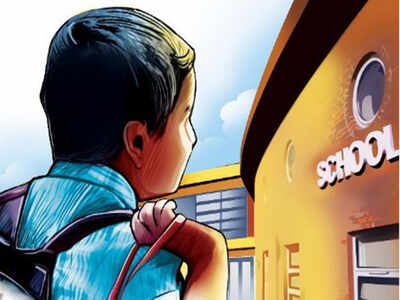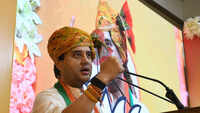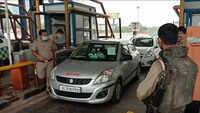
JAIPUR: The state government guidelines on the Right to Education (RTE) Act 2020-21 has kept pre-primary classes out of the ambit of 25% admissions for weaker sections and economically disadvantaged groups in private schools.
The online admission process under the RTE quota will start from July 9. The new guidelines say that admissions under RTE 2020-21 will be given in Class I or entry-level above Class I. The move will disallow beneficiary students of pre-primary education in private schools.
Majority of the private schools begin with at least two years of pre-primary classes which lays the academic foundation of the child. Now, the RTE quote students can take admission in Class I, experts fearing that will lead to a mismatch of learning outcomes between former and non-RTE quota students. Last year, out of 2.10 lakh RTE quota students, 1.20 lakh were given admission in pre-primary classes signals that pre-primary classes are popular among the beneficiary lot.
Defending the move, state education minister Govind Singh Dotasra said to have made a correction in the RTE rule for the first time since 2012. “State recognize schools only from Class 1 onwards and admission below Class I doesn’t violate the RTE Act. The private schools have been misusing the RTE Act by opening pre-primary classes up to three years which means three years of additional payment for each child under this Act. I agree that pre-primary classes are important is a reason that the state has Aanganwadi Centres for the said purpose,” said Dotasra.
For every admission under the RTE quota costs the state around Rs 10,569 which is paid in two instalments. It costs the state exchequer Rs 350 crore in 2019-20 session. The omission of pre-primary classes has angered the experts.
Pranjal Singh, of Abhyutthanam Society working for RTE implementation, termed the move ‘dilution of section 12 (1) © of the RTE Act’.
“The provision categorically mandates a 25% reservation at the entry-level whichever may be. It also comes in the violation with article 45 of the Indian Constitution which directs the state to provide early childhood care and education until they complete the age of six years,” said Singh.
Forecasting the effect of the act, Singh says that the provision will widen the gap between the privileged and the underprivileged children.
“The entry of RTE quota in Class 1 with a mismatch in the learning outcome will make the child vulnerable in the class,” said Singh.
The online admission process under the RTE quota will start from July 9. The new guidelines say that admissions under RTE 2020-21 will be given in Class I or entry-level above Class I. The move will disallow beneficiary students of pre-primary education in private schools.
Majority of the private schools begin with at least two years of pre-primary classes which lays the academic foundation of the child. Now, the RTE quote students can take admission in Class I, experts fearing that will lead to a mismatch of learning outcomes between former and non-RTE quota students. Last year, out of 2.10 lakh RTE quota students, 1.20 lakh were given admission in pre-primary classes signals that pre-primary classes are popular among the beneficiary lot.
Defending the move, state education minister Govind Singh Dotasra said to have made a correction in the RTE rule for the first time since 2012. “State recognize schools only from Class 1 onwards and admission below Class I doesn’t violate the RTE Act. The private schools have been misusing the RTE Act by opening pre-primary classes up to three years which means three years of additional payment for each child under this Act. I agree that pre-primary classes are important is a reason that the state has Aanganwadi Centres for the said purpose,” said Dotasra.
For every admission under the RTE quota costs the state around Rs 10,569 which is paid in two instalments. It costs the state exchequer Rs 350 crore in 2019-20 session. The omission of pre-primary classes has angered the experts.
Pranjal Singh, of Abhyutthanam Society working for RTE implementation, termed the move ‘dilution of section 12 (1) © of the RTE Act’.
“The provision categorically mandates a 25% reservation at the entry-level whichever may be. It also comes in the violation with article 45 of the Indian Constitution which directs the state to provide early childhood care and education until they complete the age of six years,” said Singh.
Forecasting the effect of the act, Singh says that the provision will widen the gap between the privileged and the underprivileged children.
“The entry of RTE quota in Class 1 with a mismatch in the learning outcome will make the child vulnerable in the class,” said Singh.

Coronavirus outbreak
Trending Topics
LATEST VIDEOS
City
 Good news! ICMR aims to launch indigenous Covid-19 vaccine by August 15
Good news! ICMR aims to launch indigenous Covid-19 vaccine by August 15  MP: Jyotiraditya Scindia addresses party workers through a virtual rally to mark 100 days of Shivraj Singh Chouhan govt
MP: Jyotiraditya Scindia addresses party workers through a virtual rally to mark 100 days of Shivraj Singh Chouhan govt  UP: Six men bludgeon woman to death after failed rape attempt, arrested by Etah police
UP: Six men bludgeon woman to death after failed rape attempt, arrested by Etah police  Massive border check on DND flyway from Noida to Delhi after 8 cops killed in encounter with criminals near Kanpur
Massive border check on DND flyway from Noida to Delhi after 8 cops killed in encounter with criminals near Kanpur
More from TOI
Navbharat Times
Featured Today in Travel
Quick Links
Kerala Coronavirus Helpline NumberHaryana Coronavirus Helpline NumberUP Coronavirus Helpline NumberBareilly NewsBhopal NewsCoronavirus in DelhiCoronavirus in HyderabadCoronavirus in IndiaCoronavirus symptomsCoronavirusRajasthan Coronavirus Helpline NumberAditya ThackerayShiv SenaFire in MumbaiAP Coronavirus Helpline NumberArvind KejriwalJammu Kashmir Coronavirus Helpline NumberSrinagar encounter
Get the app





